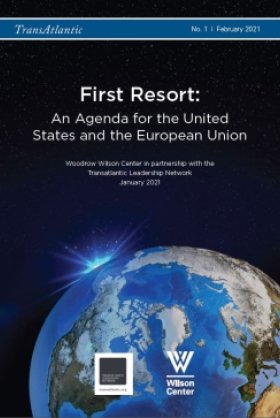First Resort: An Agenda for the United States and the European Union


The most far-reaching opportunities for future U.S.-EU cooperation are likely to transcend foreign policy; they include interrelated issues of health, resilience, climate and energy, digital transformation, creating jobs and fostering inclusive and sustainable growth. This report focuses on these key areas.
Executive Summary
Joe Biden and EU leaders have underscored that the United States and Europe are indispensable partners of first resort. The United States and the EU have a rare and potentially fleeting opportunity to reinvigorate and recast their partnership to rebuild a sense of common cause and forge a resilient Atlantic partnership that is more effective at leading our societies and economies from sickness to health, enhancing our prosperity, protecting our interests and advancing our values, and working with others to forge global responses to global challenges.
This renewed sense of common purpose is likely to start quickly – although not necessarily easily -- in the foreign policy realm. The two parties will want to ensure that U.S.-EU-UK relations remain strong and sturdy. They share a common interest in a more capable Europe, including in defense and security. And they must find common ground in identifying together where China can be a potential partner, where they agree it is a competitor, the ways in which it is a systemic rival, and what each partner can do, together or separately, to address the opportunities and challenges that accompany China’s rise. However, the most far-reaching opportunities for U.S.-EU cooperation are likely to transcend foreign policy; they include interrelated issues of health, resilience, climate and energy, digital transformation, creating jobs and fostering inclusive and sustainable growth. This report focuses on these key areas.
The most urgent priority is to lead our societies and our economies from sickness to health, including through a Transatlantic Recovery Initiative. Measures could include lifting remaining transatlantic trade barriers on, and streamlining approvals of, medical devices, supplies and other products in each other’s markets; working bilaterally and via the WTO’s Trade and Health Initiative to facilitate global trade in essential medical goods and healthcare products; and strengthening transatlantic and global supply chains.
This report was the result of several working papers. These papers are available online here:
Author


Global Europe Program
The Global Europe Program is focused on Europe’s capabilities, and how it engages on critical global issues. We investigate European approaches to critical global issues. We examine Europe’s relations with Russia and Eurasia, China and the Indo-Pacific, the Middle East and Africa. Our initiatives include “Ukraine in Europe”—an examination of what it will take to make Ukraine’s European future a reality. But we also examine the role of NATO, the European Union and the OSCE, Europe’s energy security, transatlantic trade disputes, and challenges to democracy. The Global Europe Program’s staff, scholars-in-residence, and Global Fellows participate in seminars, policy study groups, and international conferences to provide analytical recommendations to policy makers and the media. Read more

Explore More
Browse Insights & Analysis
Enhancing the Transatlantic Trade and Investment Relationship

Understanding Trade Promotion Authority (TPA): Implications for US Trade

